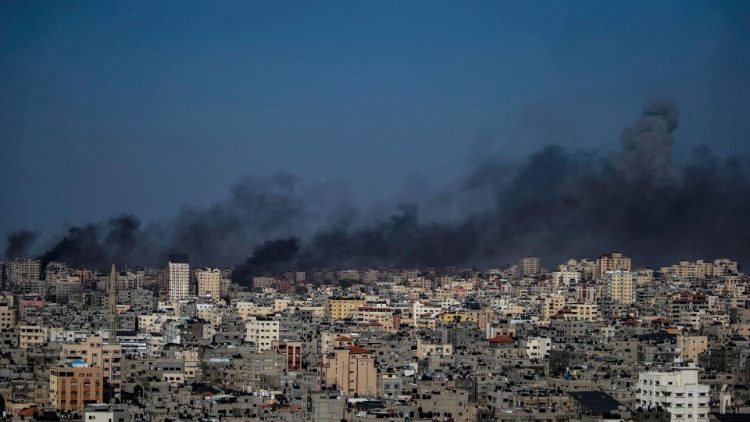“We didn’t know where the bombing was coming from, where it was landing. It could have landed on our heads at any moment.”
Alraj says whole families, civilians, sheltering in their homes were bombed. In many cases, she continues, “Their homes were levelled to the ground over them.”
Those who survived, she explains, who are lucky enough to have a basement in their buildings, were trapped under the rubble of those buildings.
This was happening she continues, to “whole squares, whole neighbourhoods in the heart of the city,” in what were the safest places in Gaza and where people were told to leave their homes.
Total confusion
The way people are told to evacuate, Alraj continues, is unbelievable, as random tweets by Israeli spokespersons would appear saying this or that square was to be evacuated or people would receive a message on social media or hear random rumours.
“So no one was sure that they had to evacuate, when, why and most importantly, where to go,” she says, highlighting the fact that “there is no place to go inside Gaza that you can say is safer than another place. There’s nowhere to go!”
Alraj describes a situation in which people “were fleeing in the streets last night, not knowing what was going to happen.”
“Their houses, like full streets and full squares, were bombed,” she says, “with people watching and getting killed and injured and ambulances that couldn’t get to them.”
Ambulance vehicles were bombed, directly targeted, she adds, killing injured people and the paramedic teams.
Living in darkness
Noting that the population has had about one or two hours of electricity in 24 hours, Alraj says Gaza has been living in total darkness for the past two days, and whatever generators exist are running out of fuel.
Water too, she adds, has been completely cut off in all of the Gaza Strip, “so we are using water very carefully.”
Food and supplies, she says, are running out and since Wednesday massacres have been taking place in the central marketplaces where people were attempting to buy food.
So now they are making do with what they have in their house, with what “they managed to stock in the first day or the first hours of the events starting on Saturday.”
The situation in the hospitals
The Oxfam official describes the situation in the hospitals as “very overwhelming,” as they run out of staff, medical supplies, of equipment, while the numbers of injuries and casualties rocket into the thousands.
She says that on Wednesday the Ministry of Health issued a formal call for volunteers asking whoever has a medical certificate or any medical experience to go to the nearest hospital or medical care center “to provide their services because of the huge pressure on the hospitals.”
“I know friends and family,” Fidaa Alraj concludes, “who haven’t received the bodies of their dead yet because there are too many in the hospitals and there isn’t enough staff even to know who’s who, to identify the bodies, or to make the necessary arrangements to get the bodies to their families.”
Death toll
More than 1,400 Palestinians have been killed and over 6,000 others injured, according to the Palestinian Ministry of Health, after Israel started bombing the Gaza Strip in response to attacks carried out by the Islamist movement Hamas on Israel from the enclave on 7 October. More than 4,000 people, including 1,500 militants from Hamas, have been killed and thousands injured in Gaza and Israel since 7 October, according to Israeli military sources and Palestinian officials.
By Alessandro Guarasci and Linda Bordoni






